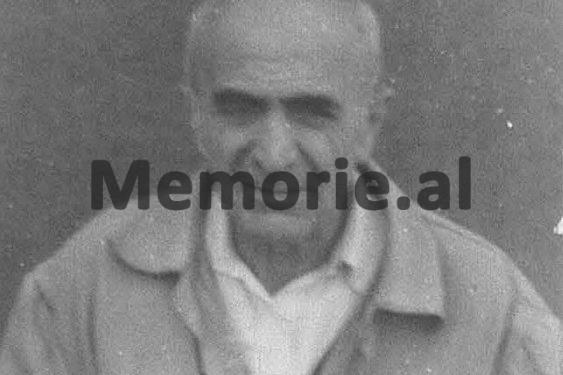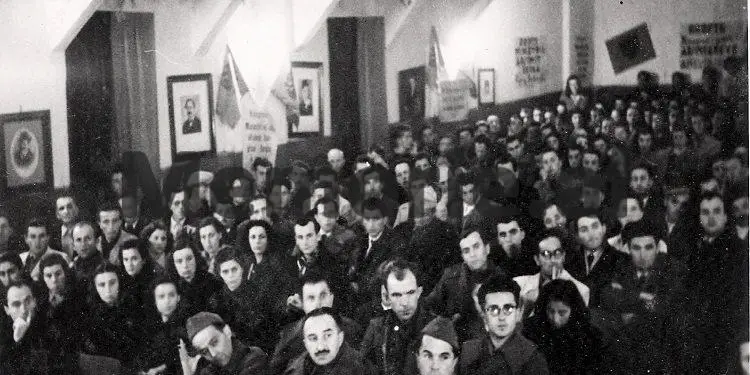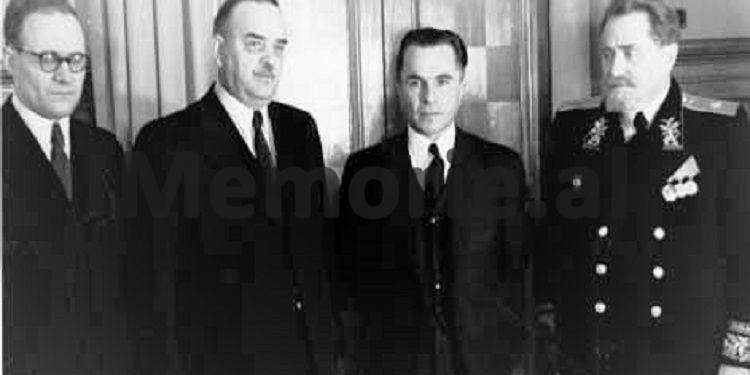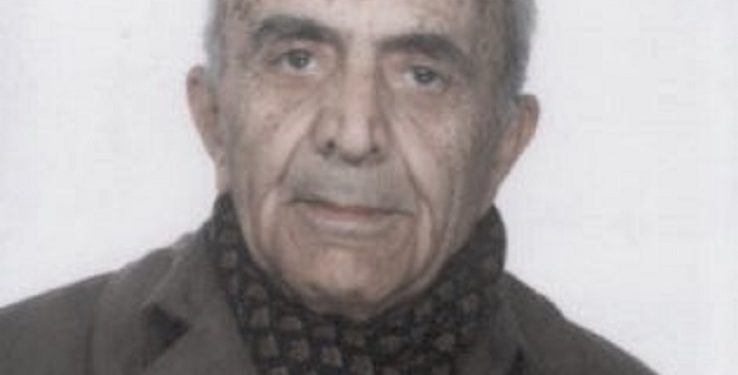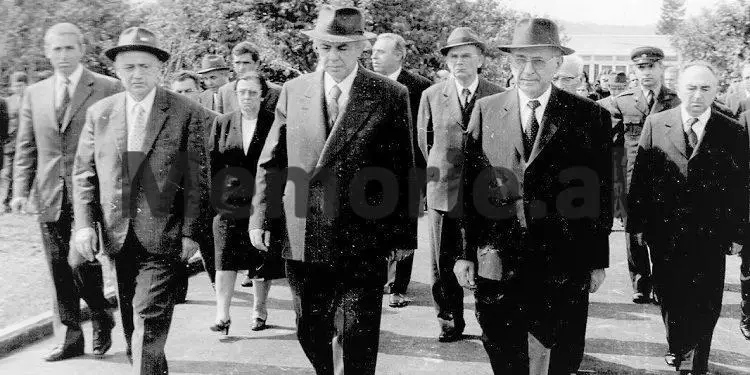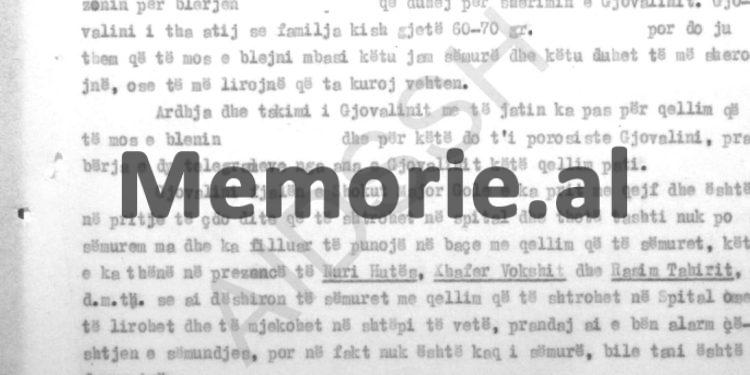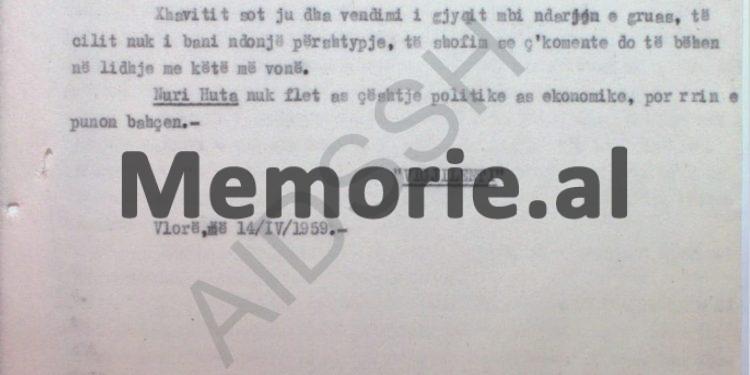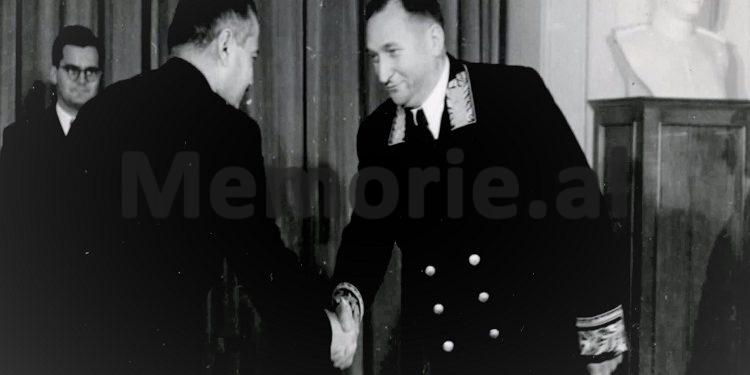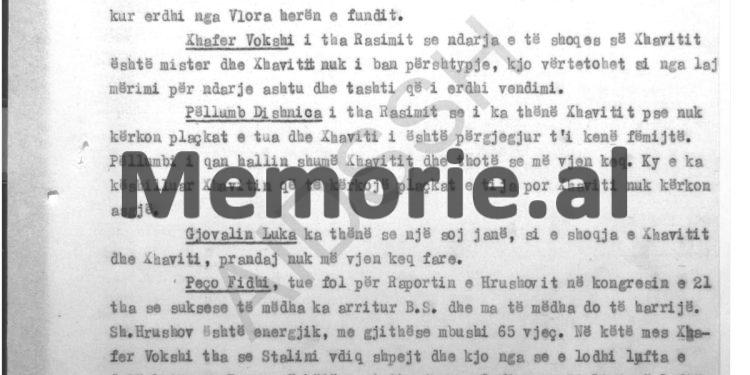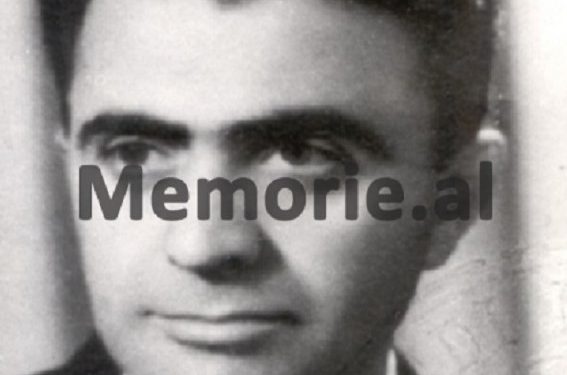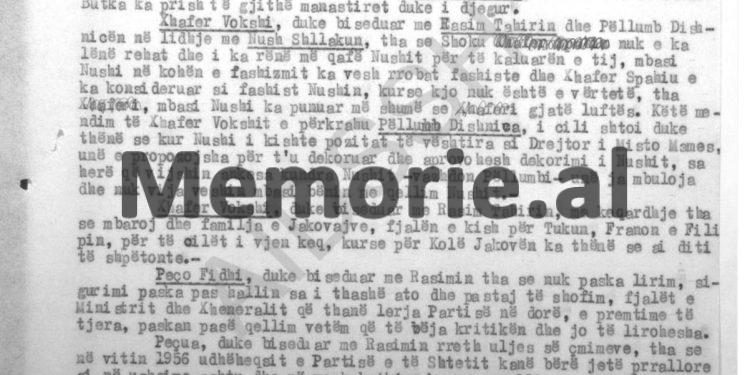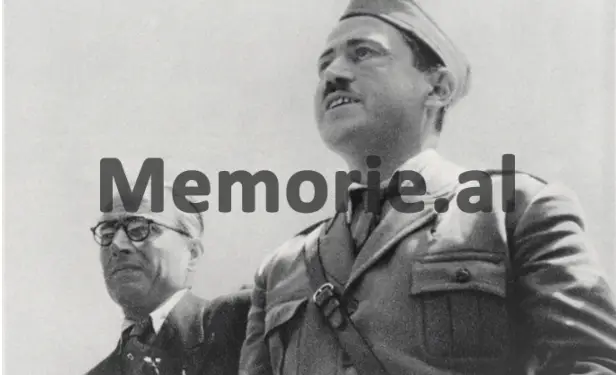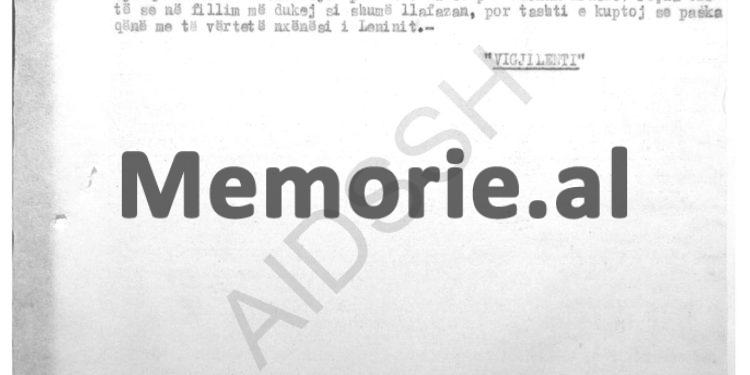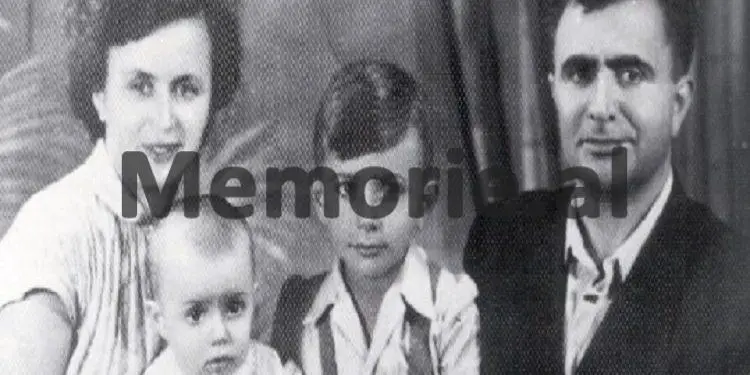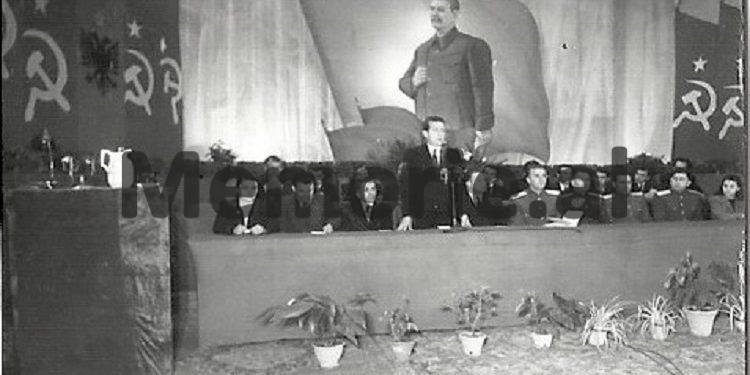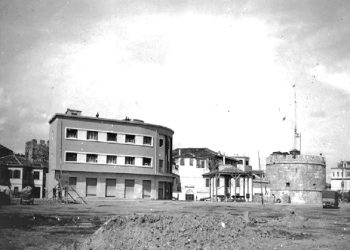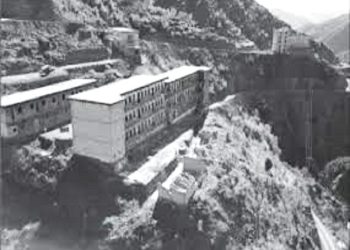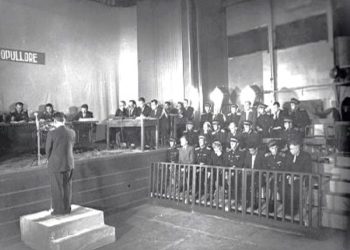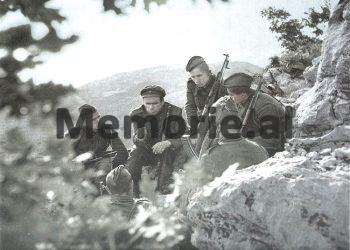Dashnor Kaloçi
Part fifteen
Memorie.al publishes a voluminous archival file issued by the institution of the Authority for Information of Former State Security Files, where there are hundreds of documents with the logo “Top secret” belonging to the former political prisoner, Xhavit Qesja, originally from the city of Kruja, whose family during the period of occupation of the country, 1939-1944, was closely associated with the Anti-Fascist Movement, being one of its main bases and made available all the wealth it had, as Xhavit was one of the first members of the Albanian Communist Party for the Kruja district, leading the Kruja-Ishëm partisan battalion and the 22nd Assault Brigade. Xhavit Qese’s political career after the end of the War, where he was appointed and served in senior positions in the Albanian Army, the apparatus of the Central Committee of the ALP, and several districts of the country, from where he was sent to study in the Soviet Union, where stayed until 1957, when he was announced to return to Albania urgently, after openly expressing his views in favor of the political line being pursued by the main Kremlin leader, Nikita Khrushchev, condemning the Stalin cult. Enver Hoxha’s conversation with Xhavit Qesen in his office in the Central Committee, where he sharply criticized him for the wrong views he had expressed during his studies in Moscow, urging him to reflect and make self-criticism, but Xhavit rejected the suggestion of the first secretary of the Albanian Labor Party, which caused him to no longer be allowed to go to the Soviet Union to complete his studies, but to be sent to work as deputy chairman of the Elbasan Executive Committee, from where a year later, he was expelled from the Party and exiled to Zvërnec Island, where the communist regime kept isolated some of the former senior party and state cadres whom he had condemned for their anti-party views. Xhavit Qesva’s long ordeal and persecution from 1957 to 1990, where he spent a full 32 years in prison and internment, being one of the few convicts in Burrell Prison who went on long hunger strikes in protest of the treatment and savage attitude of the communist regime of Enver Hoxha towards him. The complete form, investigative and judicial file in charge of Xhavit Qeses, which is published for the first time by Memorie.al, which contains the documents of the former State Security that reflect the prosecution and wiretapping against him, the reports of Security collaborators with pseudonyms their correspondence with the letters he sent to the highest party and state instances, as well as the highest leaders of the ALP, until 1991 when he was released from prison!
Continued from the previous issue
Information report of the State Security Operational Worker, Captain Maliq Mersini, with the data of the Security collaborator with the nickname “Vigëlenti”, regarding the conversations made by the internees on the Island of Zvërnec
Taken from P.O. Maliq Mersini
Given by B.p. “Vigilant”
Vlora on 14 / IV / 1959
R E P O R T
From 6 to 14 April 1959, no political or economic issues were discussed, but I would like to inform you about the health condition of Gjovalin Luka.
Gjovalin Luka, since Major Gole Bashari came and told him that we are waiting for vacancies in the hospital and we will hospitalize him, Gjovalini sent two telegrams to his wife and one to his father, so that they would not spend on the purchase _______ that was needed for Gjovalin’s recovery. Gjovalini told him that the family had found 60-70 gr. _________ but I will tell you not to buy it because here I am sick and here they must cure me, or release me to cure myself.
Gjovalin’s arrival and meeting with his father, was intended so that they would not buy it _______ and Gjovalin would order it for this, so the making of two telegrams by Gjovalin had this purpose.
Gjovalini, the word of comrade Major Gole, received him with pleasure and is waiting every day to be hospitalized and says now I am not sick anymore and has started working in the hospital in order to get sick, here he said in presence of Nuri Huta, Xhafer Vokshi and Rasim Tahiri, ie, that he wants to get sick in order to be hospitalized or released and treated at home. That’s why he raises the issue of illness, but in fact he’s not so sick, he’s fine now.
Peço Fidhi, this is awaiting release. He told Rasim that when he was in Tirana, on his way back to Vlora, he stayed in Fier and there for once he was afraid of facing any man, but later said that he did not meet any man who to face, but Major Qemal Hyseni came and told him to continue.
Pëllumb Dishnica, now he does not appear as scared before, but with all that he keeps the wires and ropes under the bed, he sits reading one of the novels that came to Pëllumb and Gjovalin, in French.
Xhafer Vokshi: during these days he was upset that he did not receive a letter and did not know about his wife if he was hired, but he does not say anything, now he received a letter and his wife was at work.
Xhavit Qesja, who spends most of his time alone and reads French novels, appears upset but does not show up to anyone. The decision to divorce his wife did not impress him.
The case of Ibrahim Dervishi was discussed and Peço Fidhi asked why he was removed as Minister of Health, Xhavit Qesja replied that he beat a student. Peço said that Medar Shtylla was the best, Xhaviti approved of such a thing and said that Medar Shtylla is very lazy. In this case, Peço said, well, they have appointed him Speaker of the People’s Assembly and Chairman of the Peace Committee, while Xhaviti did not speak, but only said that I cannot stand the lazy.
Xhaviti today gave you the court decision on the separation with the woman, who was not impressed, let’s see what comments will be made about this decision later.
Nuri Huta does not talk about political or economic issues, he is sitting and working.
“VIGILANT”
Vlora, on 14 / IV / 1959
Information report of the State Security Operational Worker, Captain Maliq Mersini, with the data of the Security collaborator with the nickname “Vigëlenti”, regarding the conversations made by the internees on the Island of Zvërnec
Taken from P.O. Maliq Mersini
Given by B.p. “Vigilant”
Vlora on 22 / IV / 1959
R E P O R T
From 14 to 21 April 1959, these matters were discussed by the persons listed below.
Peço Fidhi told Rasimi Tahiri that the separation of Xhavit Qesë’s wife should be done and they told me this in Vlora and we talked that Xhavit’s wife took a suitcase for Xhavit to the Ministry of Interior and said that this belongs. Peço told Xhavit about the suitcase when he last came from Vlora.
Xhafer Vokshi told Rasim that the separation of Xhavit’s wife is a mystery and Xhavit is not impressed, this is confirmed both by the announcement of the separation and now that the decision has been made.
Pëllumb Dishnica told Rasim that he told Xhavit why he did not ask for your belongings and Xhavit replied: to have children. Pëllumbi cries a lot for Xhavit and says that he is sorry. He advised Xhavit to look for his belongings but Xhavit does not ask for anything.
Gjovalin Luka said that they are the same as Xhavit’s wife and Xhavit, so I do not regret it at all.
Peço Fidhi, speaking about Khrushchev’s report at the 21st Congress, said the Soviet Union had achieved great successes and would achieve greater ones. Sh. Khrushchev is energetic, even though he turned 65 years old. In the meantime, Xhafer Vokshi said that Stalin died quickly and that because he was tired of the Second World War. Peço in this case said not from the war, that Stalin in World War II did not show skill and had confidence in the Germans, even the Germans when they approached Moscow, Stalin wanted to flee and leave Moscow, but Molotov has not left. Xhaferi did not accept this, but Peço said that I know this from the letters and the word that Khrushchev said, that Stalin tried to leave Moscow, Xhaferi said that it is not so, Stalin’s mistake was that he did not trust the military attaché in Berlin, for the surprise attack the Germans were preparing against the Soviet Union
Gjovalin Luka, no longer complains about the disease as before, is waiting to go to the hospital.
“VIGILANT”
Information report of the State Security Operational Worker, Captain Maliq Mersini, with the data of the Security collaborator with the nickname “Vigëlenti”, regarding the conversations made by the internees on the Island of Zvërnec
Vlora on 22 / IV / 1959
Taken from P.O. Maliq Mersini
Given by B.p. “Vigilant”
R E P O R T
Pëllumb Dishnica, reading the newspaper “Zeri i Popullit” dated April 21, 1959, where it was written on the 35th anniversary of the murder of Avni Rustemi, by comrade Koço Tashko, where it is said that Avni’s ideas had spread from Libohova to Krumë e Bajrami, by Kruma in Libohova and passed between Korça of Mihal Grameno and Seit Butka. Pëllumbi said that the people of Korça do not know Seh Butka, therefore it is not true, but they put it in vain and he was impressed that Seit Butka was named. Xhafer Vokshi also agreed with Pellumbi, who said that Seit Butka had destroyed all the monasteries by burning them.
Xhafer Vokshi, talking to Rasim Tahiri and Pëllumb Dishnica about Nush Shllaku, said that friend _______ did not leave him alone and laughed at Nushi for his past, as Nushi in the time of fascism wore fascist clothes and Xhafer Spahiu considered Nushi a fascist, and this is not true, said Xhaferi, as Nushi worked more than Xhaferi during the war. This opinion of Xhafer Vokshi was supported by Pëllumb Dishnica, who added that when Nushi had difficult positions as Director of “Misto Mames”, I proposed him to be decorated and Nushi’s decoration is approved, whenever complaints come against Nushi, says Pëllumbi, I covered it and did not listen after they did it on purpose to Nushi.
Xhafer Vokshi, talking to Rasim Tahiri, said with regret that it was over and the Jakovaj family, he was talking about Tuk, Frano and Filip, whom he feels sorry for, while for Kole Jakova, he said that he knew how to escape.
Peço Fidhi, talking to Rasim, said that there was no release, the Security had to worry about what I said to them and then let’s see, the words of the Minister and the general who said leaving the Party in hand, and other promises, were intended only to I did the criticism and not get released.
Peço, talking to Rasim about lowering prices, said that in 1956, Party and State leaders led fabulous lives, both in food and clothing, while the people suffered. This was said by Peço, I talked to Bajram Avdina, who works in the Central Committee, and now the leaders live differently, come out in agricultural cooperatives and districts and are not afraid.
Peço, about the separation of his wife with Xhavit Qesen, said that apparently these will not have gone well. If she had shared it as early as July – August 1958, as soon as we got here, that would be true, but doing so now, there is a question mark here. Whereas Xhafer Vokshi, also told Rasim about this issue, that Xhavit did it verbally with his wife, that if it was different, then Xhaviti would have ever cursed his wife or praised her, but he stays and does not speak, reads alone and was not impressed by either the court communication or the separation decision.
Gjovalin Luka, he now no longer complains about the disease, but the opinion of Xhavit, Xhaferi and Pellumbi, regarding Gjovalin’s disease, is that he deliberately made this alarm and in fact he was not as ill as he appeared.
Nuri Huta: he does not say anything, he works with Gjovalini, nor does Gjovalini say anything.
Xhavit Qesja, just reading, has not talked about any political or economic issues during this time; he only talks about novels he reads in Italian and French. Xhavit is pleased when Xhafer Vokshi speaks ill of Aqif Lleshi and Xhavit confirms it, telling him that the house of Aqif and Haxhi Lleshi’s father have always eaten with every government, therefore they have never been patriots, neither Aqif nor his father i Sh. Haxhi Lleshi, but who will give it to you.
Peço Fidhi said that Zhukov was removed because he made political mistakes when he was in Yugoslavia, he raised Tito and it is not the main thing that is said in the resolution about him. As for Comrade Khrushchev, Pecho says that at first he seemed very talkative, but now I realize that he was really a student of Lenin.
“VIGILANT”
Information report of the State Security Operational Worker, Captain Maliq Mersini, with the data of the Security collaborator with the nickname “Vigëlenti”, regarding the conversations made by the internees on the Island of Zvërnec
Taken from P.O. Maliq Mersini
Given by B.p. The “observer”
Vlora on 4 / V / 1959
R E P O R T
I am writing down excerpts from ordinary talks, as in general I have the impression that there are no “heated discussions”, because here the word is opened (I heard it from Gjovalini and Xhaferi), that arrests have been made in an anti-party element of the Tirana Conference, that Tuku, Bedriu, Hulusiu, etc .; have been convicted and are in Burrel. So they stand apart, as if confused.
Gjovalin Luka, talking about issues of literature, in a conversation with me said that:
- It is foolish to define the Tosk dialect as a literary language, as it will be determined by the development of the language itself.
- After the liberation, a deep gap was created between the north and the south, a division in the Tosca and Gheg that is manifested in the cadre issues, in the sending of cultural brigades to the north formed with elements from the south, brigades that did not work, after the people mocked them, as if these brigades could not be formed with people from the north. This division still exists and the definition of the Tosk dialect as an official language irritates him even more (in this case he mentioned the Shkodra anecdote about Tosk Albanian).
- Speaking about the poet Father Gjergj Fishta, he told me that the issue of Fishta cannot be resolved by decrees from above, he has not only bad things, but there are also strong good things, but the good of the good is silent, as this it is a matter of dice.
Speaking about today’s literature, he told me that writers and lekism (tendency to earn money) prevail in writers, that while the writer is not free in resolving conflicts as they are in everyday life, there is no art but politics. He told me that he knew the case of a young man who had just left the school as a poet and had been sent to the Soviet Union for studies, but after returning and asking Gjovalini about partisanship in literature, he said: Partisanship is easy. , I insert the word Party and Enver two or three times in each poem and the work ends, I have to open trouble for myself, I even wonder how the rest of you understand this! (He did not tell me his name). Memorie.al
The next issue follows




